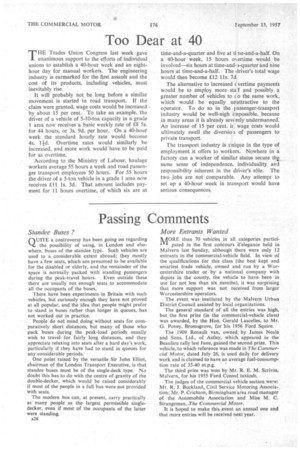Too Dear at 40
Page 28

If you've noticed an error in this article please click here to report it so we can fix it.
THE Trades Union Congress last week gave unanimous support to the efforts of individual unions to establish a 40-hour week and an eighthour day for manual workers. The engineering industry is earmarked for the first assault and the cost of its products, including vehicles, must inevitably rise.
It will probably not be long before a similar movement is started in road transport. If the claim were granted, wage costs would be increased by about 15 per cent. To take an example, the driver of a vehicle of 5-10-ton capacity in a grade 1 area now receives a basic weekly rate of £8 5s. for 44 hours, or 3s. 9d. per hour. On a 40-hour week the standard hourly rate would become 45. 14d. Overtime rates would similarly be increased, and more work would'have to be paid for as overtime.
According to the Ministry of Labour, haulage workers average 55 hours a week and road passenger transport employees 50 hours. For 55 hours the driver of a 5-ton vehicle in a grade 1 area now receives £11 Is. 3d. That amount includes payment for 11 hours overtime, of which six are at time-and-a-quarter and five at ti ne-and-a-half. On a 40-hour week, 15 hours oN ertime would be involved—six hours at time-and-I-quarter and nine hours at time-and-a-half. The ffriver's total wage• would then become £12 1.1s. 7d The alternative to increased c vertime payments would be to employ more stal and possibly a greater number of vehicles to co the same work, which would be equally unattractive to the operator. To do so in the passenger-transport industry would be well-nigh impossible, because in many areas it is already severely undermanned_ An increase of 15 per cent. ir. wage costs would ultimately swell the diversio r of passengers to private transport.
The transport industry is rnique in the type of employment it offers to workers. Nowhere in a factory can a worker of similar status secure 01E, same sense of independence, individuality and responsibility inherent in the driver's role. The two jobs are not comparable. Any attempt to set up a 40-hour week in transport would have serious consequences.




























































































